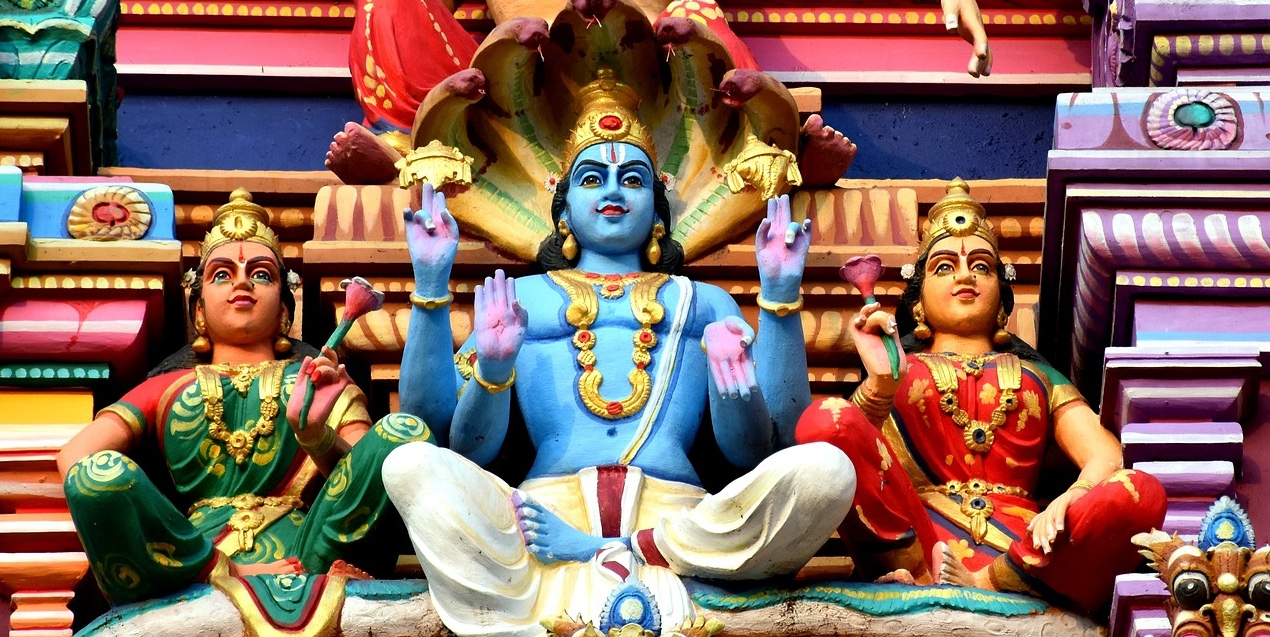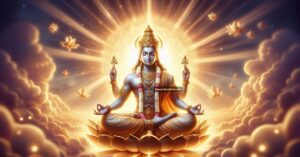Can Vishnu Sahasranamam Change Destiny?
The Shastras, hold a wealth of wisdom on various aspects of life, including the concept of destiny. Among these profound texts, the Vishnu Sahasranamam occupies a position of immense importance. This article delves into the transformative power of the Vishnu Sahasranamam, drawing directly from the wisdom of these sacred sources.
The Enchanting Legacy of Vishnu Sahasranamam
The Vishnu Sahasranamam, literally translating to “The Thousand Names of Vishnu,” is a powerful mantra found within the Mahabharata, one of Hinduism’s epic sagas. It consists of 108 verses, each glorifying Lord Vishnu. According to the Mahabharata itself, the warrior Bhishma, lying on a bed of arrows after the Kurukshetra war, narrated these thousand names to Yudhishthira, the righteous Pandava king. Bhishma explains that chanting these names brings immense benefits, both material and spiritual.
Power of Names
न विष्णुसहस्रनामास्ति तत्तुल्यं परमं स्मरणम्।
मोक्षार्थी सर्वकामेभ्यो निवृत्तचित्तो जपेत्तु तम् ।।
There is no remembrance (smaraṇam) greater than the Vishnu Sahasranamam for attaining moksha. One seeking liberation, with a mind withdrawn from all desires, should chant it.
विष्णुसहस्रनाम जप्यं सर्वपापविमोक्षणम्।
दुःख नाशं सुखं दानं सर्वलोकहिताय च।।
Chanting the Vishnu Sahasranamam leads to liberation from all sins. It destroys suffering, grants happiness, and benefits all beings.
न विष्णुसहस्रनामास्ति स्तोत्रं तत् तुल्यं कर्मणि।
यद्दत्ते सर्वपापघ्नं च मोक्षं च परमं नृणाम्।।
There is no ritual comparable to the Vishnu Sahasranamam stotram. It grants the destruction of all sins and the ultimate liberation for humans.
The Vishnu Sahasranamam, by chanting his various names, invokes these potent qualities of the divine. Each name signifies a unique attribute or aspect of Vishnu’s power.
In Hinduism, names are not mere labels. They are believed to hold the essence of the being they represent. Chanting a mantra, therefore, is not simply uttering sounds; it is a form of focused meditation, invoking the qualities and energies associated with the mantra.
The Vishnu Sahasranamam, with its 108 names, offers a comprehensive exploration of Lord Vishnu’s divine nature. Each repetition of a name reinforces specific qualities within the devotee, gradually transforming their character and aligning them with the divine.
Karma and the Path to Destiny
पूर्वजन्मकृतं कर्म सुखदुःखाय जायते।
तत्फलं भुञ्जते प्राणी तस्मात्कर्म समाहितम् ॥
The karma done in the previous birth leads to happiness and sorrow. The living being enjoys the fruits of that karma. Therefore, one should be focused on one's actions.
कर्मफलं कर्मजनितं स्वयं भुञ्जते जन्तुः।
न तत्र देवो न पितरो न राजा फलदा नृपः॥
The living being himself enjoys the fruits of karma arising from his own actions. Neither a god, nor a father, nor a king is the giver of the fruits.
कर्मणा क्लिश्यते जन्तुः कर्मणा सुखमेधते।
कर्मणैव हि संसारं गच्छत्यागच्छति चापरम्॥
By actions, a living being suffers, by actions, he attains happiness. By actions alone, he goes to the cycle of rebirth and comes back from it.
The concept of karma, the law of cause and effect, plays a central role in shaping one’s destiny in Hinduism. Our actions, thoughts, and intentions in this life and past lives (punarjanma, rebirth) create karmic imprints that influence our present and future experiences.
The Shastras do not suggest that the Vishnu Sahasranamam erases karma altogether. Lord Vishnu, also known as Narayana, is the ultimate creator, preserver, and destroyer. Only he possesses the power to dissolve the karmic knots that bind us.
Understanding Karmas
The Shastras categorize karma into different types based on their intensity and influence:
Sanchita Karma: This refers to the accumulated karma from all past lives, a vast storehouse of actions and their consequences.
Prarabdha Karma: This is the portion of sanchita karma that determines our current life experiences, including our physical body, family background, and overall circumstances.
Kriyamana Karma: These are the actions we undertake in our present life, which will create future karma.
Dridha Karma: The Unyielding Knots
Within the category of prarabdha karma, some karmas are considered “dridha karma,” meaning strong or unyielding. These are typically the consequences of very serious actions committed in past lives, such as taking another’s life, betraying a trust, or causing immense suffering. Dridh karmas are believed to be difficult to mitigate and may manifest as significant challenges or obstacles in one’s current life.
For example, a dridh karma could manifest as a chronic illness with no known cure, a birth defect, or a series of unfortunate events. While the Vishnu Sahasranamam cannot erase such karmas entirely, it can offer solace and strength through the connection with the divine. It can also help an individual cultivate the mental fortitude and spiritual resilience to navigate these challenges with greater grace and acceptance.
The Gradual Transformation Through Chanting
However, the Vishnu Sahasranamam offers a powerful tool for mitigating the effects of karma. Here’s how:
Purification of the Mind: Chanting the divine names fosters a sense of devotion and purifies the mind. A pure mind is less susceptible to negative thoughts and actions that create detrimental karma.
Grace of Vishnu: By sincerely chanting the Vishnu Sahasranamam, devotees seek the blessings of Lord Vishnu. His grace can help alleviate the burden of past karma and pave the way for a more positive destiny.
Spiritual Growth: Regularly chanting the Vishnu Sahasranamam fosters spiritual growth. As one progresses on the spiritual path, their connection with the divine deepens, allowing them to transcend the limitations of karma.
The Gradual Unfolding of Destiny
The effects of chanting the Vishnu Sahasranamam on changing one’s destiny are gradual and multifaceted. The karma accumulated over lifetimes cannot be erased overnight. However, with sincere devotion and regular practice, the Vishnu Sahasranamam can:
Reduce Negative Influences: The chanting may mitigate the negative consequences of past karma, leading to a more favorable turn of events.
Open Doors to Opportunities: By aligning oneself with the divine qualities of Vishnu, the chanting can open doors to new possibilities and positive life experiences.
Empower Inner Strength: The practice cultivates inner strength and resilience, enabling devotees to navigate life’s challenges with greater grace and fortitude.
Beyond Destiny
Ultimately, the Vishnu Sahasranamam transcends the concept of merely changing destiny. It is a powerful tool for self-transformation. Therefore, it serves as a transformative guide on the path to moksha (liberation) – the ultimate goal of Hinduism. By consistently chanting these divine names, devotees not only navigate the complexities of destiny but also elevate their consciousness, ultimately seeking to break free from the cycle of rebirth altogether.
The Vishnu Sahasranamam is not a magic formula for instant gratification. It is a sacred practice that, with dedication and devotion, can gradually transform one’s life. Through its power to purify the mind, cultivate spiritual growth, and invoke the blessings of Lord Vishnu, the Vishnu Sahasranamam empowers individuals to navigate their destiny with greater clarity, resilience, and ultimately, a deeper connection with the divine.









Krishna Ashtakam